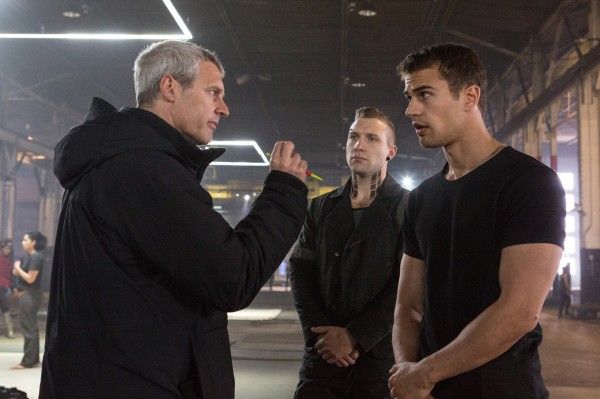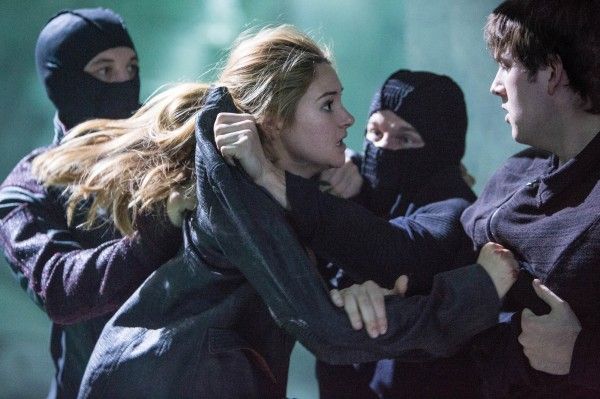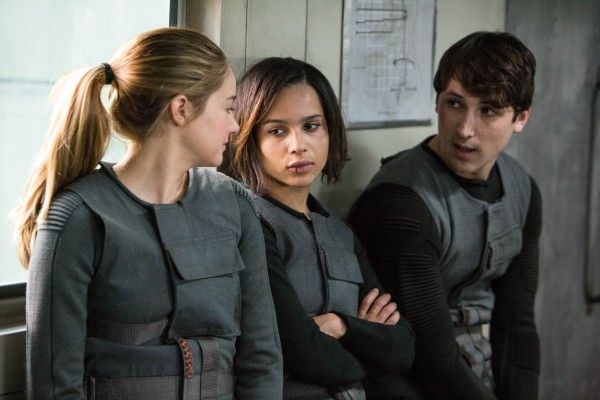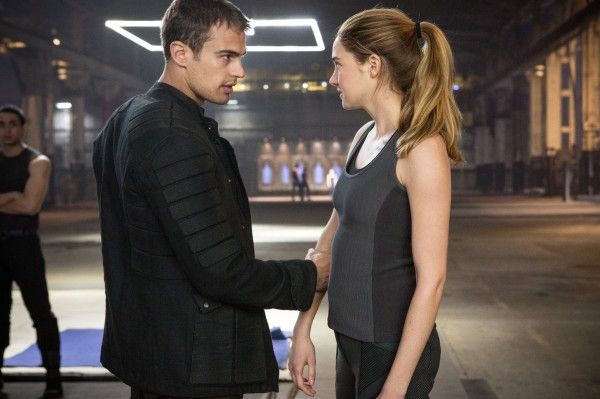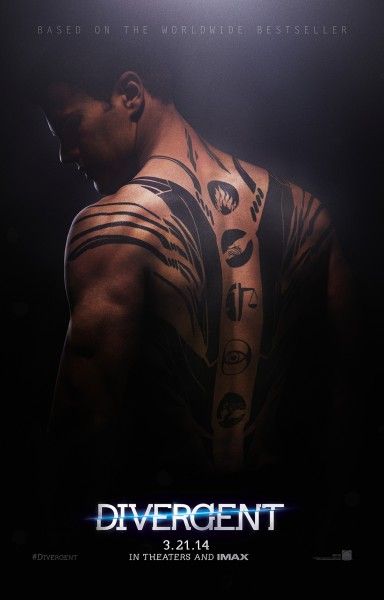Behind every big book-to-screen franchise is a producer, steering the massive, multi-film undertaking to hopefully great success. Harry Potter had David Heyman, Twilight had Wyck Godfrey, and Divergent has Douglas Wick. Along with his producing partner Lucy Fisher, Wick has been working hard to bring an adaptation of Veronica Roth’s beloved novel Divergent to the screen, and now the first film in a potential trilogy is due to open theaters in just a few short months. Wick has been heavily involved with every major decision on the film, from hiring the director to finding the right cast, so when I got the chance to speak with the producer on the set of Divergent earlier this year along with a handful of other journalists, he spilled plenty of details about how the adaptation came together.
During a break in filming a stunt sequence involving actors jumping from a moving train, Wick discussed using the city of Chicago as a major part of the film, the lengthy director search and why they chose Neil Burger to take the helm, the extremely difficult task of finding the right actor to play the male lead Four, similarities to The Hunger Games, getting input from Roth, locking the cast for multiple films, and more. Hit the jump to read on.
Question: How do you go about getting insurance for all of this?
DOUGLAS WICK: It’s actually a very laborious process, but basically the insurance people come and pre-approve everything. So any stunt, or if someone’s standing on a wall for a scene, they’ll say unless the person’s wearing a harness they won’t insure it. So they actually will go through everything we would do and make a judgment and they say “that’s too risky” or “you can’t do this.” But Garrett’s pretty amazing. As you can tell, he’s really smart and he knows his stuff. So we’re pretty careful. One problem we’ve had with Shailene—you know Shailene has done survival courses and she’s always saying, “higher, higher, higher!” We’re doing a scene on the Ferris wheel and she says, “How come I only get to go this high?” She’s fearless.
Speaking of the Ferris wheel, there are a lot of Chicago landmarks in this movie. Were there any landmarks that you weren’t able to use?
WICK: No, we got a lot of receptivity from the Chicago Film Board. I mean we had to work it within constraints, for example doing the Ferris wheel was a little arduous. We had to work around their schedule because it’s sort of a city landmark so you can’t shut it down that much. And one of the most interesting things about the Ferris wheel is obviously since it’s 100 years in the future it’s supposed to be distressed. How do you make it seem distressed and have it ready for public use the next day? So they created—aside from a little mud that you could wash off—they created these decals that would look like rust, so they could put the decals on and later take them off. So it’s still the Ferris wheel but you believe it’s 100 years in the future, otherwise everything becomes a computer effect, which becomes prohibitive.
How much of that decision to keep things grounded was aesthetics and how much of it was just a certain conscious decision to not make it like cotton candy wigs and castles and stuff like that?
WICK: It was a very deliberate decision of Neil Burger’s, because here would’ve been the sensible thing to do money-wise: you would’ve come to Chicago for two weeks, and then gone to Louisiana for the rebate and built everything there. That would’ve been the sort of money-wise sensible thing to do. Neil felt very strongly, as did Andy Nicholson our designer, that there are a lot of worlds you see that when they’re created in the computer, there’s no there there. It still looks fake and somehow on an intuitive level you don’t feel you’re in a real place, and so it’s not quite as interesting. His feeling was that the more places you actually see a real tactile thing—I mean building Abnegation obviously we’re changing the skyline behind it but it’s still a real location.
Even the place where they go to school in the opening scene, the fact that that’s a real place that we dressed the portals or each faction, but then the camera will turn—and the computer will have to take care of this—but the train will pull right up to there. It’s really exciting when you see that scene, because you see all the other factions waiting in line and then for Dauntless there’s just the name over the portal and there’s no line, so you’re kind looking and you say, “Gee there’s all the other lines but there’s no line for Dauntless.” The camera turns over, you see the train pull in, and the cool people jump off and they go right in. So that again, by being blocked into that Chicago stuff, it was a very deliberate creative decision to give a sense of place.
And I think it’s more accessible because it’s not these crazy outfits or hair styles like Blade Runner or something.
WICK: No and that was also [very deliberate]. Carlo Poggioli who did the costuming stuff is amazing. I had worked with Ann Roth, who is one of the great American costumers, a few times and I called her and I asked her about Carlo and she said he’s one of four designers in America who can actually go from his head of thinking up something new, actually into materials and execution. A lot of people are great buyers and do stuff, but Carlo can actually conceptually start to say what’s Erudite, what’s Dauntless, and have that actually turn into materials and design. When you look at those costumes there’s so many details, and Carlo as a storyteller came up with the detail like the Dauntless born would have a slightly different color than outsiders. A great costumer is also a storyteller.
What was the director search like and what made Neil the right guy for the project? Did he come in with a really specific take that was different from everyone else?
WICK: He had a very specific take. The director search was really hard because the movie requires a lot of things. In addition to world creation—which is a really high skill level to be able to create your own world—there was costuming every character, finding someone who can craft them is different from someone who can shoot a great Halloween. And then cerebral in terms of things like fear landscapes, how would you create rules? How would you re-integrate that into the story? So really big storytelling challenges; how do you do the fear landscape? And then most importantly, I think if you love the book you know how much everything is archetypal and connected to life, whether it’s something as simple as you don’t know who your mom is, and during the course of the story you start to say, “Oh my mom is more than I thought she was,” which sort of everyone goes through in their right of passage. So above all it was someone who also loved character.
We had people who were great shooters, great action people who wanted to do it, and then we had people who were great character people but you didn’t think they could ever do the breadth of the storytelling; the kind of epic thing. We just met with a lot of people, they would come in and make presentations and they would use reference material to talk about palette, they’d use clips of other movies to say what the world might look like, we’d talk about casting, and Neil was just by far the best. He’s a very good writer so in terms of a very difficult adaptation he was very smart about it, how to both tell kind of a macro story—like Erudite taking over the whole world to somehow move that story forward while you’re moving a very personal young woman’s right of passage, and a love story.
Did he work on the screenplay too? Did he do a rewrite?
WICK: No, but he was very involved in it and it was a difficult one to solve. It’s sort of like, “Okay the love story with Four is working great, but what about the Erudite plot?” And then also when you have opportunities, we knew fairly early that we were gonna have Kate Winslet, so Jeanine’s a great character but now you also need a director who’s smart enough and sophisticated enough to understand about creating a performance. So how do you make Jeanine a launching pad for Kate’s talent? And that’s when you just need someone who has a very high skill level.
The premise has quite a few surface similarities to The Hunger Games. Was that something you were at all worried about, and is there thought being put into differentiating between the two to the public?
WICK: We were always mindful that there would be that comparison. I mean The Hunger Games is mostly in the woods; much of the visuals of the movie are people fighting in a kind of rustic environment. And here our movie is very much in an urban world, it’s much more detailed relationship stories. So I think we felt that as we started to release frames from our movie, it would seem completely different and it just would sort of take care of itself.
How much are you guys thinking ahead? Because I know you’re already writing the next one, so are you going to tuck all the sets away and save them or will you rebuild?
WICK: We’ll save what we can, but now everyone’s just trying to make one great movie. Which is hard (laughs). But right now everything depends on making one great one.
So are you guys trying to craft a film that stands on its own and not just a preview for the next one?
WICK: Oh totally; that’s been the ambition from the beginning. But also the book does that, I mean the book is a hugely satisfying experience or else nobody would’ve been curious about a sequel. One of the things that we were very aware of when you looked at other movie structures to the book is that it has the Full Metal Jacket of you join a platoon, you train, and then you get into action at the end. So there’s that kind of movie structure, then you have that Rite of Passage love story where you leave your parents behind, so it has so many full meal layers that if we can make them all converge, it’ll be great. And also there’s the young woman Rite of Passage, who am I, identity, first dealing with your physical fear and then dealing with your mental/emotional fear through the fear landscapes, that’s also a journey. So if we don’t mess it up, it should be a really full, multi-layered meal.
Making a movie when the third book isn’t out yet, how much effort are you taking not to contradict what’s going to happen in Allegiant?
WICK: We talk to Veronica [Roth] a lot. But as you know, she’s not contradicting her first two books and she’s very intuitive. One of the great things about the second book is as people start to make appearances, like you go on a train you go, “Oh there’s that guy, he’s now leading the Factionless.” So she’s very good at giving you the beginnings of something and then jumping ahead and saying, “Okay, now here’s where they are.” She’s very good at keeping true to her people.
Have you ever run into a situation where she says, “No you can’t do that because when you get to the third book, this happens?”
WICK: We haven’t had that yet. We’re faithful to the book but every time we try and do something different—which she’s always said do what you need to—we’d find out that the book was better than what we tried, which gives you a lot of confidence. I’ve done a lot of movie adaptations and the source material is a great resource, particularly if it’s good, but then some you go back to and they fail you. And the more you go back to it you go, “Oh, that person wasn’t quite as talented as I thought.” The experience of going back to her is that she has just a golden gut. On an intuitive level things are in the right place.
What do you think is the biggest artistic license you guys have had here?
WICK: I think having Four die in the first book (laughs). I mean there’s details, some things are not fully described in the book so you make leaps as you go. Or again little things, like I said Carlo came up with the idea that Dauntless-born have a slightly different color in their wardrobe.
Uriah’s not really in the first movie though, right?
WICK: Yes that’s true, Uriah’s not. The reason of leaving Uriah out of the first movie is simple: it’s such an important part of the second book that it’s hard to get a great actor to come and stay here for three months for thirty seconds [of screentime] because we need him in the group.
On the flipside, with a lot of adaptations sometimes the authors say, “This one line or this one scene, you really need to nail this because this is important to my fans.” Is there an equivalent on this movie?
WICK: We’re very mindful of what the fans have responded to, so for example we have lists from online of favorite pieces of dialogue. Frankly we’re fans or else we wouldn’t be doing it, so we’re very aware of it but as you know the thing the fans are gonna most want is that the movie works great. So we’ve had scenes where there’s a line that we love from it and it’s a love scene with Tris and Four and you go, “Shoot, that line is intrusive, the love scene isn’t working.” So we do talk about could we put it somewhere else? But it’s sort of that balance.
One of my favorite things from Limitless was the amazing camerawork from Neil. Was there anything that he brought to this film that’s gonna be new and exciting?
WICK: A lot. First of all Alwin H. Küchler is a great Director of Photography, so even when they were talking about shot of the camera following with Tris, that’s a Neil idea. That’s probably the best example. But yeah it is sort of like each time trying to figure out how the camera works to best dramatize the experiences.
We keep hearing about Marvel’s difficulties in signing its actors for these big multi-picture contracts. When you sit down to get actors for this, are you also locking them in for the sequels?
WICK: Oh very much so. And remember, the studio we’re doing business with has done Twilight and Hunger Games. So they come in with all these stories of Jennifer Lawrence’s other options, that schedule stuff, so one goes in very aware of it. The other thing that you’re aware of is how much each of these actors’ lives are going to change, because they really are an amazing ensemble. I remember when I did Gladiator we were in Rome, the movie was showing in Italy and it hadn’t yet shown in the States. We were with Russell Crowe and Ridley Scott and people were pushing Russell out of the way to get a picture with Ridley Scott, and you just had the feeling that in about 10 minutes this is gonna so change. And with these young actors, I mean Shailene already has a following but she’s indelible as Tris, and Theo is just gonna explode. So there’s so many, you know Christian Madsen, we just sort of joke around about how much their lives are going to change. Of course the Lionsgate and Summit people know all the stuff of what those actors have been through, so there’s a real sense of camaraderie.
Was it part of the negotiation process?
WICK: Not so much because they all loved the material. Luckily when the material’s really great everything’s easier. When you’re doing something that has no real creative core and everyone’s doing it for the money it’s a much uglier situation, but when everyone is just in love with the material and in love with the characters, they’re saying to their people, “Make this work.”
I interviewed Veronica recently and she said when she saw Theo James as Four, that was kind of like the one character where it really matched her vision. Who for you matched what you saw in your head?
WICK: Well Theo was huge because we really looked, looked, looked, failed, failed, failed. I was there when we did the test that Veronica was talking about and we were anxious about that. Shailene we got right away, and we wanted her and she was perfect. You just know you’re going to go through that movie on her face and she makes everything true, because that’s what Veronica does, in every scene you’re not in an epic you’re in a true experience and she pulls you right there. I would say there are a few [who matched for me]. You know who really just almost feels like he pops out of your brain is Christian as Al. Just exactly the way he looks and he feels like he dropped out of the book. Shai as Tris. Kate Winslet as Jeanine just seems like, you know when we started to talk to her, “What’s she gonna do with that?” I would say Christian because he just is Al.
What was the casting process for Four like, because it seemed like that was one of the last roles that you filled?
WICK: We suffered. We looked at so many of the would-be movie stars, you know that guys who they say, “This one’s gonna break,” because part of the Four thing is you have to be a great actor, you have to have some kind of beach handsome where you say, “That guy’s got the look.” When you cut to him you have to say, “Wow, that guy’s Paul Newman, that guy’s really cool,” or the storytelling isn’t gonna work. And then we also did chemistry tests with a bunch of guys and Shailene. There were a lot of guys that were kind of beach handsome and kind of cool would-be Mel Gibson’s in 20 years, a lot of Australians, and none of them had that thing where they were both really magnetically attractive but also felt mysterious. With Four you’ve gotta believe in him, as Veronica always does.
So we just kept testing and failing and then when we finally brought him in with Shailene it all felt obvious. We all know him from Downton Abbey and it’s interesting how memorable that one episode is. He said he had problems in interviews because people kept thinking somehow he was really connected with the show even though he was on for that short thing. Also, by the way, where I think it’s a breakout role for him is it really uses his talent well. If you saw him on the TV show [Golden Boy], I didn’t personally think it was a great use of his talent. Part of here is he is a guy who is both very manly, but he feels like he has secrets. So there’s something interesting about playing him that way that uses the best of him.
Now that social media plays a role in casting sometimes, did you feel compelled to see some actors that maybe the fans had suggested?
WICK: Well we actually looked at all those tweets because we were a little bit desperate (laughs). I mean cause you’re thinking, “Shoot we’re actually making this movie and if we get a mediocre Four, it’s fundamentally gonna be disappointing.” So we looked at all of those, we didn’t necessarily see anybody for that reason, but we kept looking, “Are we missing somebody? Who could it be?”
Are you prepared for the craze that could come from this? Are you taking notes from The Hunger Games and Twilight in terms of promotion and Comic-Con and stuff?
WICK: Yes, and by the way this movie is in great hands. Lucy and I feel lucky, Veronica feels lucky, Neal feels lucky. When you think about Summit/Lionsgate, there’s no studio that understands these movies, that respects the fanbase, that communicates with them in a very direct way, and already has communication with them. So from the very beginning they’ve come right in and said, “Here’s this experience, here’s that experience.” They’ve talked to the actors about some of the experiences that will be ahead of them. So we’ve been educated, it’s certainly unlike any experience I’ve ever had.
Is there any experience in particular that you’re looking forward to?
WICK: I’m really looking forward to seeing the movie all come together, because there’s so many parts that look really great. I’m both excited and nervous, as you always are, about that weave. Once you have all this stuff it’s a lot of a weave to get; if it all weaves together, it will just be so exciting.
Peruse the rest of our Divergent set visit coverage below:
- DIVERGENT Set Visit Report; 30 Things to Know about the Next Big YA Franchise
- Shailene Woodley and Theo James Talk the Pressures of the Franchise, Differences from the Book, and More on the Set of DIVERGENT
- Director Neil Burger Talks Making the Future Feel Cinematic Instead of Gritty, the Portrayal of Violence, Filming in Chicago, and More on the Set of DIVERGENT
- Zoe Kravitz Talks Bonding with Castmates, Fight Training, Consulting Jennifer Lawrence for Advice, and More on the Set of DIVERGENT

